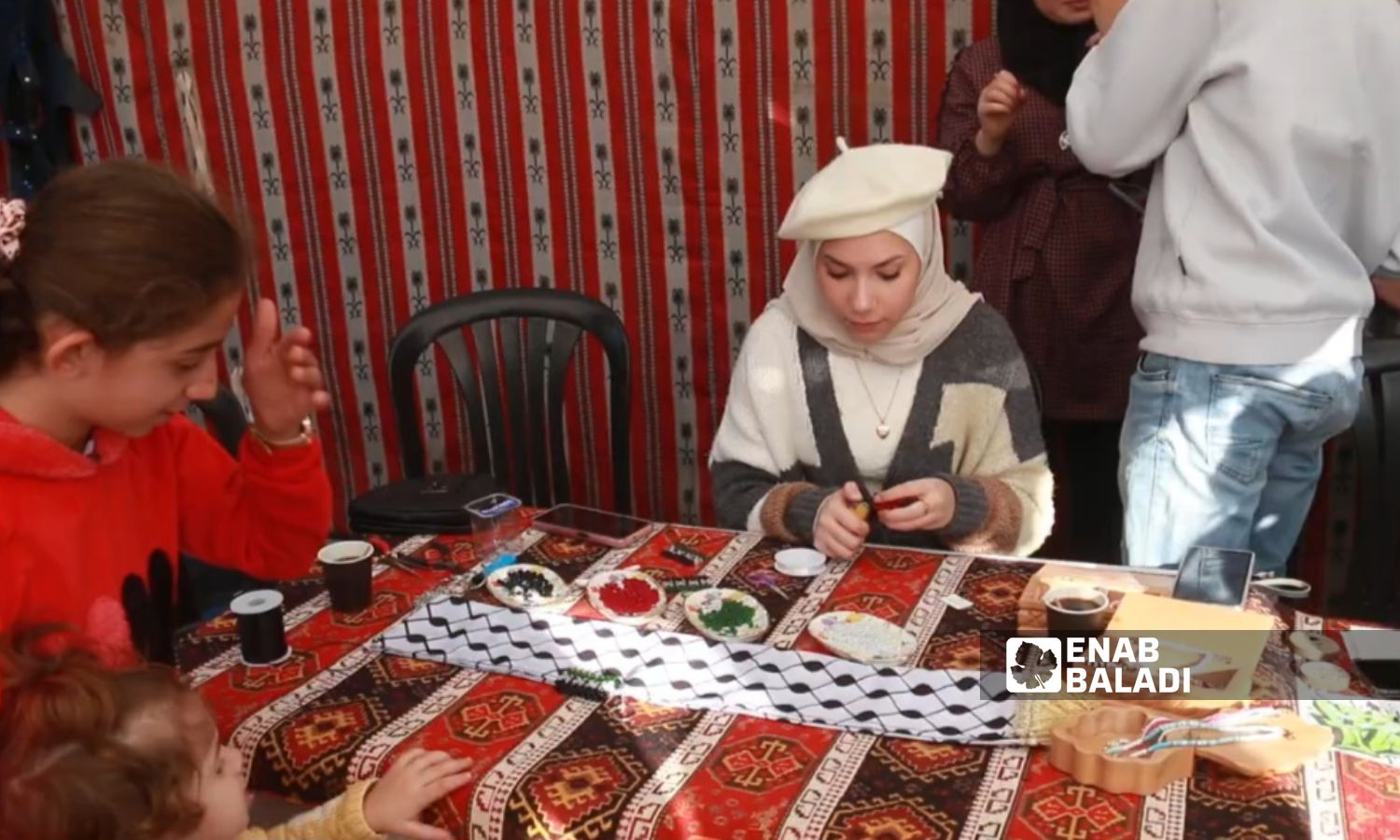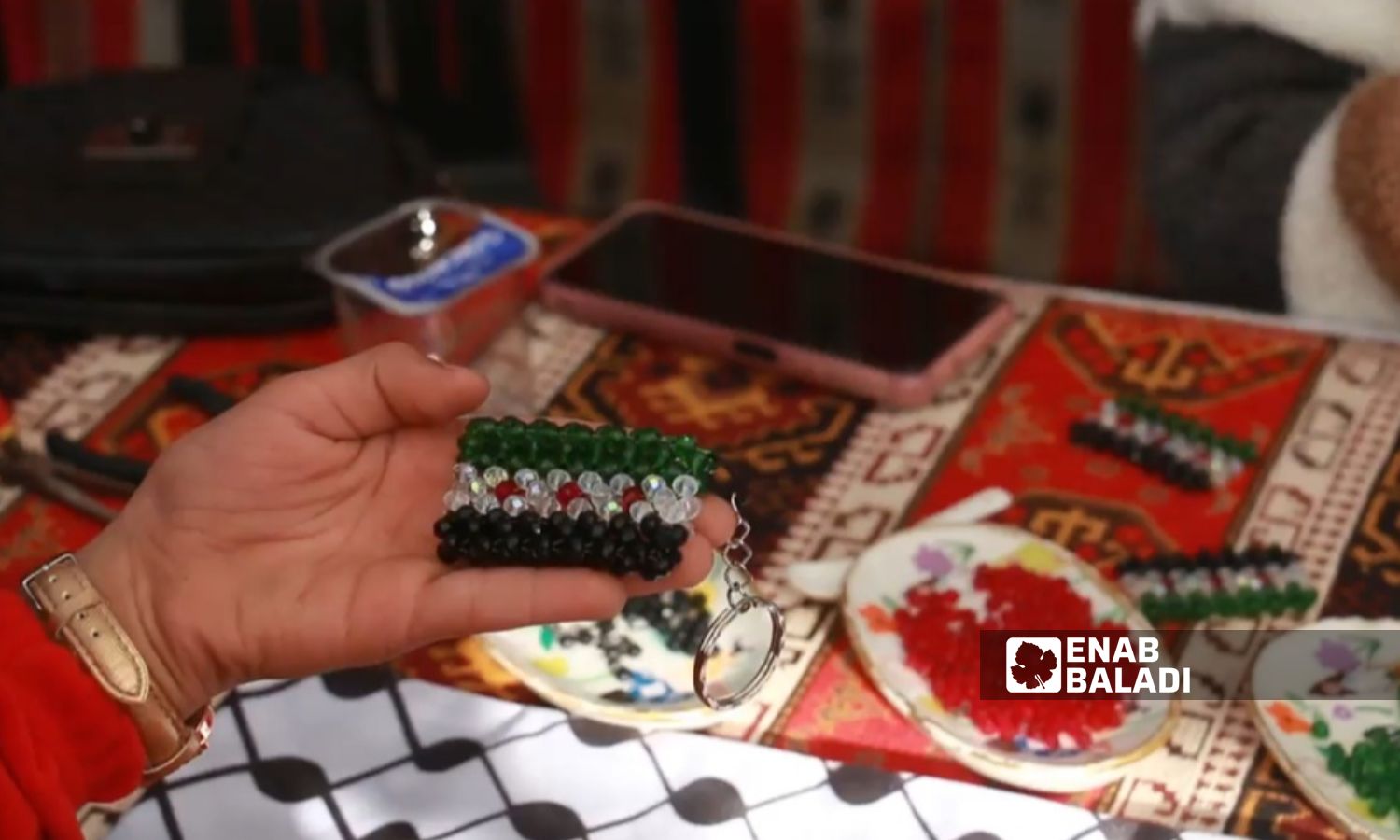



Azaz – Dayan Junpaz
Young women in the city of Azaz in the northern countryside of Aleppo are working on innovative projects and activities that they design themselves, to achieve modest financial returns and to pursue their passion.
Luna al-Qare’, 17, who was displaced from Damascus, told Enab Baladi that she started making beady accessories and medals in her childhood when she was in her city Damascus, before being displaced to northern Syria.
She mentioned that she used to engage with her friends in a competition to develop their talent and create unique pieces for personal use, based on ideas from social media platforms.
Al-Qare’ added that her pieces impressed everyone who saw them after she arrived in northern Syria, which encouraged her to turn her hobby into a profitable project that she relies on at times, and she named it “Luna Store.”
Al-Qare’ sells various accessories made of beads, including necklaces, chains, and earrings, in addition to small pieces such as rings and medals, and she utilized her free time to develop her skills in making those unique pieces.
Due to the lack of materials in the area, al-Qare’ had to import some components from Turkey, and her pursuit of a secondary school diploma (Baccalaureate) did not stop her from continuing her work.
Aya Mohammed al-Bish, 20, a university student in the city of Azaz, discussed her project, which she named “Perfecto by Aya”, consisting of embroidering artistic paintings using threads of multiple colors, and this type of embroidery is called “Etamine”.
Al-Bish told Enab Baladi that the stages of her work start with drawing the design, then following it with the process of embroidering on various pieces, such as clothes, bags, and various fabrics, pointing out that she puts effort into preparing artistic paintings dedicated to occasions and brides, taking into account the preferences and desires of the clients to provide a unique and distinctive artistic product.
The young woman indicated that she was inspired by her love for drawing and her desire to develop her hobby into a distinctive profession and that her work is not limited to traditional embroidery only but represents a unique mix and combines the beauty of threads and the charm of colors.
The young woman sells her paintings and works at prices ranging from 30 to 90 US dollars (each dollar is 29 Turkish liras and 14,500 Syrian pounds), depending on the clients’ requests, and the price of simple pieces and works can be ten dollars.
Al-Bish considers these prices relatively high due to the difficulty of obtaining the required materials and tools in the area, and her reliance on online markets to import materials from Turkey. Despite this reliance, she faces delays in receiving her orders in northern Syria, which puts her in front of additional challenges in managing and developing her activity.
Al-Bish prioritizes between her university studies and her hobby represented in her private project, as she considers it a means of entertainment and a way to release her energy more than being a source of income, but it helps her in covering some of her university expenses.
Sabah Dadeekhi, 23, from Azaz, told Enab Baladi that she started to think about expanding the scope of her project, which she named “Funoon Jawa,” and making it a main source of income, and she seeks to purchase a printer to facilitate her work in preparing distinctive gift boxes, flower bouquets, and designing innovative mobile protection covers.
She added that her work has started to compete with specialized stores in preparing gifts, and her products have become of lower cost, as she offers flower bouquets at prices depending on the type and number of flowers and protective covers at a fixed price of 80 Turkish liras.
She mentioned that the prices of the paintings range between 100 and 200 Turkish liras, providing different sizes. As for the prices of gift boxes, they start from 20 US dollars and reach 100 US dollars, depending on the contents inside, while the lowest value of gift boxes in the stores is 60 US dollars, making her products an attractive choice for many.
The young woman seeks to offer products characterized by quality and innovation, to help her attract customers and achieve financial success.
The three young women rely heavily on social media platforms as a basic means of marketing their products, especially through the Instagram platform, through pages with different names that suit each individual project’s nature.

A young Syrian woman making accessories from beads in the northern city of Azaz in Aleppo countryside – November 22, 2023 (Enab Baladi/Dayan Junpaz)
Projects supervised by women are active in northwestern Syria and constitute a source of income for their families, and institutes and centers provide training courses in various fields supported by local organizations and authorities.
Despite the presence of private projects and training institutes, women are engaged in exhausting and hazardous professions, in order to secure their multiple needs, amid rising prices and low wages.
Some women, especially those residing in displacement camps in northern areas, resort to work in professions locally known as a specialization of men or to activities fraught with danger, such as searching among garbage piles for plastic, with the spread of unexploded ordnance from the remnants of war.
A report by the WILPF (Women’s International League for Peace and Freedom) on “Women in the Syrian Economy” indicated that the conditions of war have imposed “complex economic responsibilities on Syrian women, with the absence of the traditional breadwinner and a large segment of them being physically disabled in most cases, especially in the northern areas outside the control of the regime.”
The report, issued in March 2021, mentioned that the poor economic conditions have forced women to work in a way that the traditional Syrian society is not accustomed to in order to secure the necessities of life in the midst of extremely harsh and severe conditions.
if you think the article contain wrong information or you have additional details Send Correction